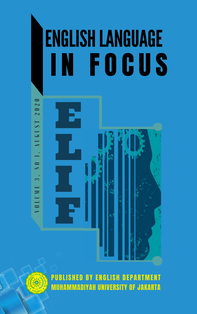Rudyard Kipling’s Novel the Jungle Book as Moral Literacy Material on EFL Learning
DOI:
https://doi.org/10.24853/elif.3.1.23-30Keywords:
the jungle book, moral literacy, EFL learningAbstract
Education plays an important role in the formation of human character. One of the keys to successful students who have a strong personality is the selection of learning material. This study aims to explain that moral literacy in the novel The Jungle Book by Rudyard Kipling in the form of ethical sensitivity, ethical reasoning abilities, and moral imagination. This research is a qualitative descriptive type and uses an objective approach. The theory used is Nancy Tuana's Moral Literacy. The results showed that the form of ethical sensitivity in The Jungle Book is in the brotherhood and heroic action The form of ethical reasoning is in the reasoning for the nature of gratitude and the nature of the consequences of revenge. Moral imagination lies in brotherhood and self-defense efforts. Thus, moral literacy in the novel can be an alternative material for moral literacy the which is useful in the development of students' character.References
Aghagolzadeh, F., & Tajabadi, F. (2012). A Debate on Literature as a Teaching Material in FLT. Journal of Language Teaching and Research, 3(1), 205–210. https://doi.org/10.4304/jltr.3.1.205-210
Begley, P., & Tuana, N. (2007). Conceptualizing Moral Literacy. Journal of Educational Administration, 45(4), 364–378. https://doi.org/10.1108/09578230710762409
Creswell, J. W. (2014). Research Design: Qualitative, Quantitative, and Mixed Methods Approaches. Sage Publication Inc.
Eripuddin. (2017). The Analysis of Plot and Setting as Found on the Jungle Book Movie. Jurnal Ilmiah Edu Research, 6(1), 1–8. http://journal.upp.ac.id/index.php/edureseach/article/view/212
Ihejirika, R. C. (2014). Literature and English language teaching and learning: A symbiotic relationship. English Language Teaching, 7(3), 85–90. https://doi.org/10.5539/elt.v7n3p85
Kipling, R. (2000). The Jungle Book. Pearson Education Ltd.
Mette, R. (2011). Colonialism, Children’s Literature and Translation. The Colonial Gaze: A reading of the text and illustrations in Italian versions of The Jungle Books. In D. R. Miller (Ed.), Prefazione agli Occasional Papers del CeSLiC. http://amsacta.cib.unibo.it/view/series/Quaderni_del_CeSLiC._Occasional_papers.html.
Nurgiyantoro, B. (2007). Teori Pengkajian Fiksi. Gajah Mada University Press.
Rizzo, K., & Bajovic, M. (2016). Moral Literacy Through Two Lenses: Pre-service Teachers’ Preparation for Character Education. International Journal of Teaching and Learning in Higher Education, 28(1), 131–138. http://www.isetl.org/ijtlhe/
Selian, H., Suhadi, J., & Manugeren, M. (2017). Heroism in Rudyard Kipling’s the Jungle Book. Language Literacy, 1(1). https://papers.ssrn.com/abstract=3113930
Siaj, R. N., & Farrah, M. A. A. (2018). Using Novels in the Language Classroom at Hebron University. Journal of Creative Practices in Language Learning and Teaching (CPLT), 6(2), 44–59.
Downloads
Published
Issue
Section
License
Authors who publish with this journal agree to the following terms:
- Authors retain copyright and grant the journal right of first publication with the work simultaneously licensed under a Creative Commons Attribution License that allows others to share the work with an acknowledgment of the work's authorship and initial publication in this journal.
- Authors can enter into separate, additional contractual arrangements for the non-exclusive distribution of the journal's published version of the work (e.g., post it to an institutional repository or publish it in a book), with an acknowledgment of its initial publication in this journal.
- Authors are permitted and encouraged to post their work online (e.g., in institutional repositories or on their website) before and during the submission process, as it can lead to productive exchanges, as well as earlier and greater citation of published work (See The Effect of Open Access).


